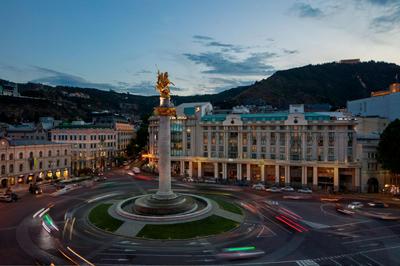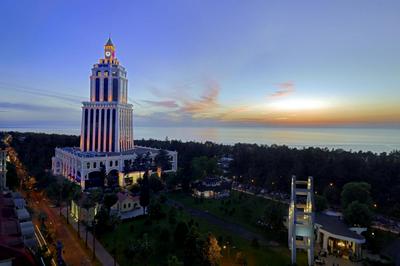When to visit Georgia during the year?
Georgia experiences a diverse climate with warm summers and cold winters, making it a year-round destination. Summer (June to August) is popular for its beautiful beaches along the Black Sea coast, particularly in Batumi, where tourists flock for sunbathing and water sports. Spring (April to June) and Autumn (September to October) are ideal for hiking in the Caucasus Mountains, offering stunning landscapes and mild weather. Winter (December to February) attracts skiers to Gudauri and Bakuriani, where the slopes come alive with snow. Annual tourist visits peak during summer, with around 1.5 million international arrivals.
How to get to Georgia?
Reaching Georgia is convenient with various options available. Tbilisi International Airport serves as the main international gateway, connecting travelers to numerous destinations worldwide. Additionally, there are bus and train services that facilitate travel within the region. It’s also feasible to explore by car, thanks to a network of highways.
- Main airports include Tbilisi International Airport (TBS) with routes from New York (JFK), London (LHR), Istanbul (IST), Dubai (DXB), and Moscow (DME).
- Low-cost airlines like Wizz Air operate flights to and from Europe.
- Flight times vary; for example, a flight from London to Tbilisi is approximately 4 hours.
- Main stations are situated in Tbilisi, where you can take buses to Kutaisi, Batumi, and other cities.
- Buses connect Georgia with nearby countries such as Armenia and Azerbaijan.
- There is international train service from Tbilisi to Baku (Azerbaijan) and Yerevan (Armenia).
- Travel duration varies; for example, a train ride to Baku takes around 12 hours.
- Main highways include the E60 and the E70 connecting to neighboring countries.
- Distances from major cities: Tbilisi to Baku is about 600 km, and to Yerevan, it's around 280 km.
- Road conditions are generally good, though some mountainous areas may have tolls.
Tourist activities in Georgia
Georgia offers a rich tapestry of activities influenced by its diverse landscapes and vibrant culture. In Tbilisi, explore the charming Old Town, where vibrant architecture meets traditional markets. The city’s nightlife is lively, with numerous bars and clubs that showcase local music and cuisine. Outdoor enthusiasts can trek in the Caucasus Mountains, particularly in Kazbegi and Svaneti, popular for stunning vistas and ancient churches. Adventure seekers can partake in white-water rafting on the rivers or skiing in Gudauri during winter. In addition, the wine region of Kakheti invites visitors for unforgettable tastings and vineyard tours. Each region boasts unique traditions, from folk dance performances to culinary classes, ensuring a well-rounded travel experience.
Accommodation in Georgia
Georgia’s accommodation options range from luxury hotels to cozy guesthouses. In Tbilisi, expect to find boutique hotels priced at around $80 to $150 per night, while budget hostels start at approximately $10. The seaside city of Batumi offers beachfront resorts, with rates similar to Tbilisi. In rural areas and wine regions, charming guesthouses are common, offering a unique cultural experience at $30 to $70 per night. Seasonal variations affect prices; summer in coastal areas sees higher rates compared to off-peak months in spring and autumn. Choosing local guesthouses can enhance your cultural immersion, while well-known hotel chains provide familiar amenities.
Food in Georgia
Georgian cuisine is a feast for the senses, known for its flavorful dishes and rich traditions. Signature offerings include Khinkali (dumplings) and Khachapuri (cheese-filled bread), often enjoyed with a glass of local wine, as Georgia is one of the oldest wine regions in the world. Traditional meals typically cost between $10 and $20, while street food is available for just a few dollars. Popular eateries can be found throughout Tbilisi; for a local experience, try restaurants like Cafe Littera or Tabla, where you can savor home-cooked dishes. Alongside delicious food, try Chacha, a potent grape spirit that embodies Georgian hospitality.
Important numbers and information
- Emergency services: Police - 112; Ambulance - 112; Fire brigade - 112.
- Embassy contacts: US Embassy - 11 Alexander Dadiani St, Tbilisi, +995 32 227 7000.
- Tbilisi International Airport (TBS) - 12.2 km from Tbilisi city center.
- Currency: Georgian Lari (GEL); major payment methods accepted include credit/debit cards and cash.
- Visa requirements: Many nationalities can enter Georgia visa-free for one year; check specific regulations based on nationality.
What to see in Georgia?
Georgia boasts a wealth of attractions across its diverse terrain. Start with Tbilisi, the capital, where you can explore the stunning architecture of the sulfur baths and the ancient Narikala Fortress. Venture to Kazbegi National Park for breathtaking mountain views and the iconic Gergeti Trinity Church. The coastal city of Batumi offers a vibrant promenade, beautiful beaches, and the famous Batumi Botanical Garden. Don’t miss the ancient town of Mtskheta, a UNESCO World Heritage site, known for its churches and historical significance. In the wine region of Kakheti, visit Tsinandali Estate and numerous wineries to delve into the country’s rich viniculture.
History, geography and climate
Georgia's history is a tapestry of various influences, with roots stretching back to ancient kingdoms such as Colchis and Iberia. The country has faced invasions and occupations throughout history, yet has retained its unique culture. Geographically, it’s characterized by the towering Caucasus Mountains to the north and the lush Black Sea coast to the west. The diverse landscape varies from mountainous regions to low-lying valleys. Georgia enjoys a temperate climate; summers are warm, averaging 28°C (82°F), while winters see temperatures drop to around -2°C (28°F) in some areas. This climatic diversity allows for a rich variety of flora and fauna.
Population and culture
Georgia is home to around 3.7 million people, primarily of Georgian ethnicity, with about 9% belonging to other ethnic groups. Georgian is the official language, and the majority of the population adheres to the Georgian Orthodox Church, reflecting a profound religious heritage. The country is vibrant with traditions, ranging from polyphonic singing to folk dances performed during festivals. Significant holidays include Christmas, Easter, and Independence Day, celebrated with food, music, and communal gatherings. The unique Georgian script and its ancient art forms demonstrate the rich cultural identity that has been preserved over centuries.
















